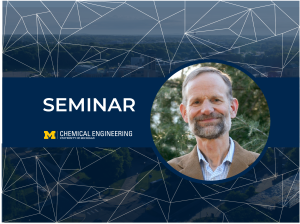Presented By: Chemical Engineering
ChE SEMINAR: "Insights into Battery Operation through X-ray Scattering"
Mike Toney, University of Colorado Boulder

Abstract:
Electrochemical energy storage is an enabling technology as humanity transitions to a carbon neutral economy. While Li-ion batteries are presently the dominate technology, a diversity of energy storage needs demands a diversity of storage technologies. My research group is focused on helping to enable these types of batteries through an understanding of their operation and degradation modes, using operando X-ray based methodologies coupled to electrochemistry.
In this talk I will discuss several vignettes including (i) demonstrating the Na storage mechanisms and heterogeneous nanopore filling in hard-carbon anodes for Na-ion batteries, (ii) presenting a novel pathway explaining self-discharge in Li-ion cathodes where hydrogenation of layered transition metal oxide induces self-discharge through hydrogen transfer from carbonate solvents to delithiated oxides, (iii) determining that the degradation pathways in Li-ion batteries under extreme fast charging involved predominately heterogenous Li-metal plating in full cells. One focus of our research is on quantification of competing electrochemical processes as a way to guide implementation of methods to improve battery systems.
Bio:
Mike Toney is a professor of Chemical and Biological Engineering and the Materials Science and Engineering Program. His academic interests are on materials for sustainable energy with a focus on understanding the physics and chemistry that underlie the functioning of these materials, especially for batteries, photovoltaics and more recently clean water. His research involves characterization using various X-ray scattering, spectroscopy and imaging methods with strong interest in interfaces and soft matter. Prior to coming to CU, he worked at the IBM Almaden Research Center and the SLAC National Accelerator Laboratory. Mike’s goal includes strengthening the Front Range’s research and development in sustainable energy materials.
Electrochemical energy storage is an enabling technology as humanity transitions to a carbon neutral economy. While Li-ion batteries are presently the dominate technology, a diversity of energy storage needs demands a diversity of storage technologies. My research group is focused on helping to enable these types of batteries through an understanding of their operation and degradation modes, using operando X-ray based methodologies coupled to electrochemistry.
In this talk I will discuss several vignettes including (i) demonstrating the Na storage mechanisms and heterogeneous nanopore filling in hard-carbon anodes for Na-ion batteries, (ii) presenting a novel pathway explaining self-discharge in Li-ion cathodes where hydrogenation of layered transition metal oxide induces self-discharge through hydrogen transfer from carbonate solvents to delithiated oxides, (iii) determining that the degradation pathways in Li-ion batteries under extreme fast charging involved predominately heterogenous Li-metal plating in full cells. One focus of our research is on quantification of competing electrochemical processes as a way to guide implementation of methods to improve battery systems.
Bio:
Mike Toney is a professor of Chemical and Biological Engineering and the Materials Science and Engineering Program. His academic interests are on materials for sustainable energy with a focus on understanding the physics and chemistry that underlie the functioning of these materials, especially for batteries, photovoltaics and more recently clean water. His research involves characterization using various X-ray scattering, spectroscopy and imaging methods with strong interest in interfaces and soft matter. Prior to coming to CU, he worked at the IBM Almaden Research Center and the SLAC National Accelerator Laboratory. Mike’s goal includes strengthening the Front Range’s research and development in sustainable energy materials.